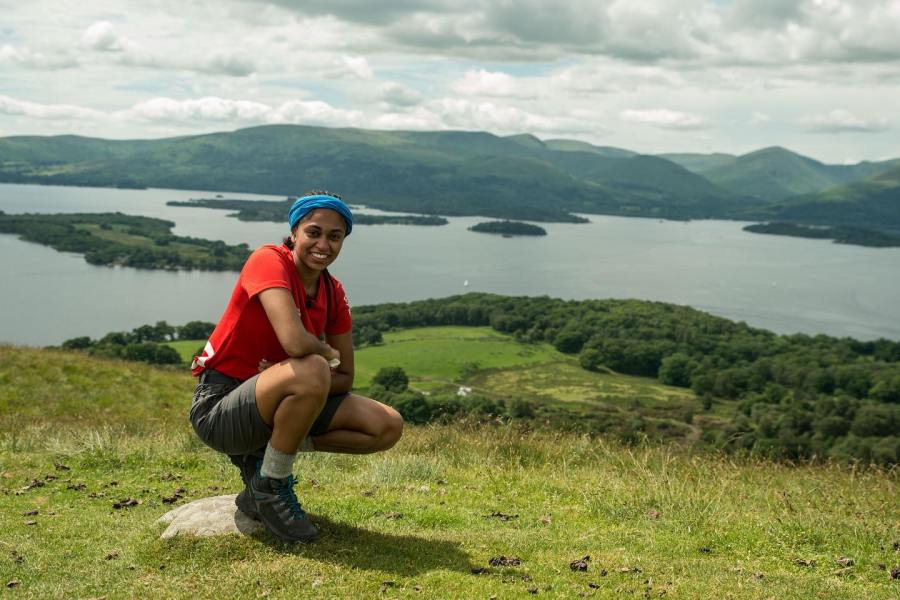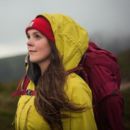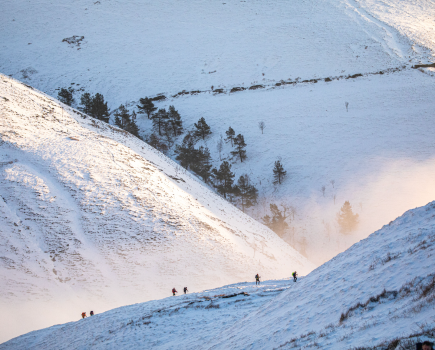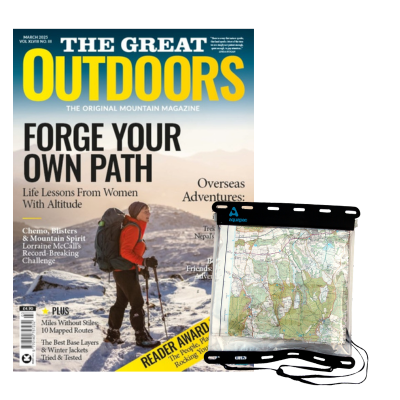Kwesia is 24-year-old South East Londoner, qualified youth coach, mother, mentor, podcaster and YouTuber on a “mission to connect inner city people with the nature on their doorsteps”. There are many systemic barriers young people face, she says. From unsafe housing to low-income levels, their priorities must lie elsewhere. “Many have normalised their urban, overcrowded and sometimes threatening environments” and “there is little room for play and exploration” in their realities. But this ‘City Girl in Nature’, a Linnean Society John Spenden Lewis Award winner, is on a mission to break these down by being her “authentic self” and sharing her “journey of struggle and renewal” with others.
Main image: Kwesia in her element in the Trossachs. | Credit: @citygirlinnature/Instagram
Kwesia grew up in Deptford which, in her words, is a place of poverty, unmet needs, gentrification, hidden racism and discrimination. It’s also home to communities who live with a great deal of joy and resilience. Indeed, the open space of Deptford Park is still one of Kwesia’s favourite places to spend time in nature, ID’ing wildflowers or birdwatching. Here, she tells The Great Outdoors how nature became her “happy place” as a young person experiencing challenges both “indoors and inside myself” and her own journey of self-discovery.
TGO: Hi Kwesia! Can you introduce yourself and your City Girl in Nature projects?
Kwesia: I am a You Tuber and have my own online channel where I share content on my mission to connect inner city people with the nature on their doorsteps. Creating series one was a phenomenal experience for me, and from which I continue to feel the ripple effects. I am currently releasing series two on my further adventures with people and places. I run workshops in schools and community spaces introducing people to the great outdoors, particularly young people, building their confidence and appreciation of the natural world.
When called upon, I also mentor younger people who may be struggling a little bit with the things going on with them, being a friend and a positive role model. I am looking forward to taking young people to camp out in our national parks this summer, and leading youth workshops at a retreat on the island of Iona, North West Scotland. I have recently been delighted to receive the John Spenden Lewis Award from the Linnean Society for the work that I do. Looking forward, I hope very much to continue being a door opener, and an enabler, creating and facilitating opportunities for young people to be able to see the world around them, and inside them, in new and healing ways.
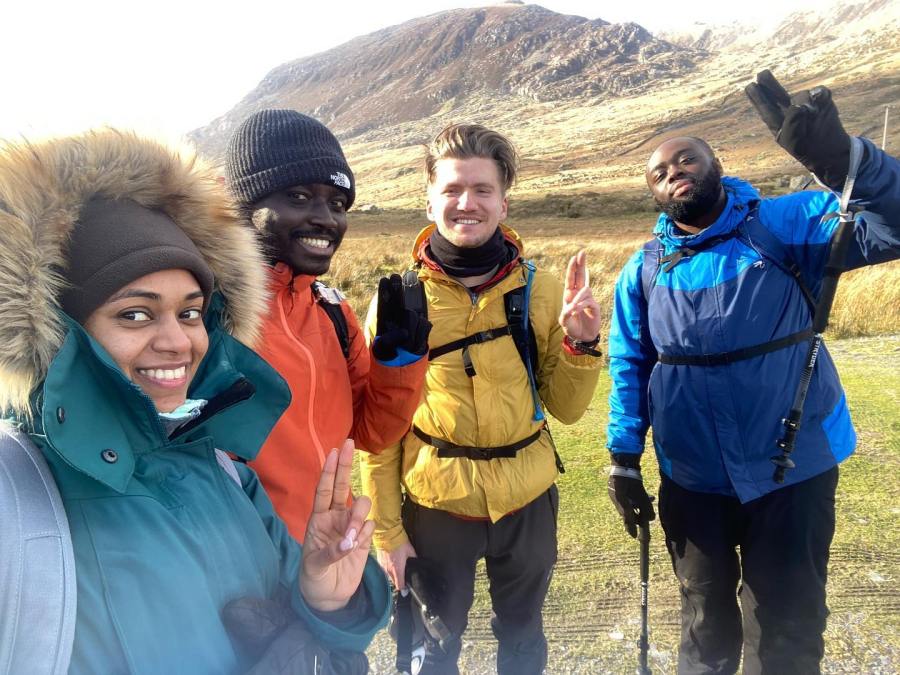
Walking in the Carneddau, Eryri/Snowdonia. Credit: City Girl in Nature
TGO: Can you tell us a little bit about where you grew up?
Kwesia: I grew up in Deptford, South-East London. As an inner-city area, it has experienced its fair share of multi deprivations. Much of the area is made up of housing estates which have been neglected by the council, and many of the families that live there often don’t have enough money to make ends meet. There is a great deal of poverty and unmet needs. A large minority is from black and minority ethnic communities, who experience a great deal of racism and discrimination, often hidden, which impacts on our health and well-being. Having said that, with this diversity and multiculturism, there is a great deal of joy. The togetherness of people, all experiencing the same things, looking out for each other, makes it a very resilient and strong community.
More recently, Deptford is experiencing a period of regeneration and gentrification which is leading to already marginalised groups becoming more invisible as new more wealthy residents change the landscape of the area. In doing so, much of the diversity is becoming erased, and with this the soul of the community.
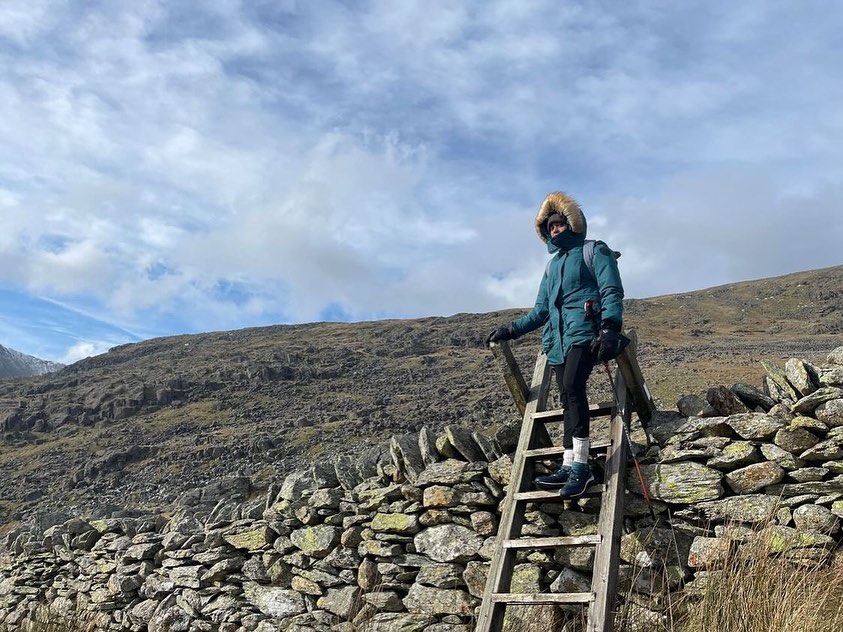
Kwesia in the Carneddau. Credit: City Girl in Nature.
TGO: How did you come to spend time outdoors and realise this was a happy place for you?
Kwesia: Being outdoors with friends growing up was always a happy place for me, and an outlet from some of the challenges I was experiencing indoors, and inside myself. I have a passion for football, having been a sports scholar at my secondary school, and a pursued this through to gaining FA Level 2 in Coaching, as was a representative on the FA Youth Council.
The light, the open spaces, the fresh air, the company of friends, the innocence, the freedom to roam, all combined to give me space to breathe deeply, and was a contrast to what were often very distressful and suffocating experiences for me in other spaces.
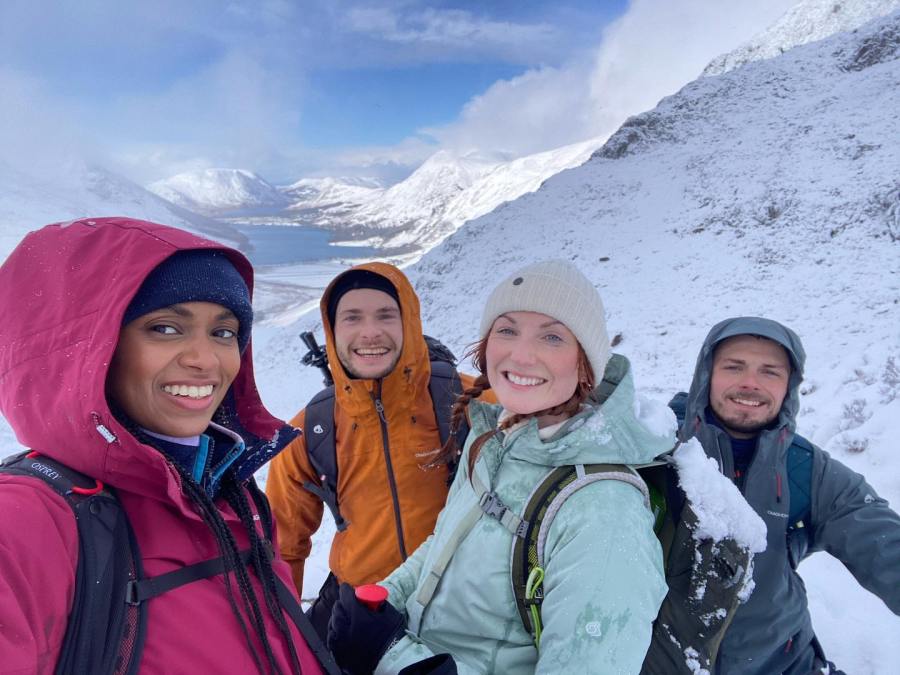
Shooting for Craghoppers in the Lake District. Credit: City Girl in Nature
TGO: I understand you’ve experienced trauma in your life? If you’d be comfortable doing so, could you share your story?
Kwesia: Life was tough growing up, as it was for many of us in the area. I grew up in a single parent household, and my Mum had her own challenges she was dealing with, so I didn’t have much support in trying to make sense of the things that were happening to me, and around me. In a very short period, I experienced a great deal of loss, grief, and trauma. My grandmother, who suffered from Parkinson Disease and Alzheimer’s came to live with us and I helped my Mum care for her, and quite often was her main carer when my Mum was not at home. She passed away in our house.
Soon after that my Aunty was murdered at the hands of her husband, my uncle. He set fire to the house they lived in, and in doing so also seriously injured my three cousins that were also in the house. At the time, this was widely reported as an ‘Honour Killing’. My friend at school was stabbed and killed. I spoke at his funeral, about the relationship we had. There was over a hundred people at his funeral, many of our school friends, all mourning together. None of us received any help or support with our loss. None of the hundreds of other young people who have also experienced such loss because of knife crimes receive any help or support either.
I couldn’t manage and cope with all of this, and my mental health started to deteriorate, and I soon found myself in conflict with everyone around me and became homeless. I began to misuse drugs and alcohol and moved from sofa to sofa and lived in several youth hostels feeling isolated and miserable, and experienced suicidal thoughts.
The outdoors gives me a non-judgemental space to be myself and to reflect on my experiences. Observing nature often teaches me things about who I am, as part of the world around me. It’s something I believe everyone should start to tune into and tap into a natural rhythm and frequency that they may not have experienced before.
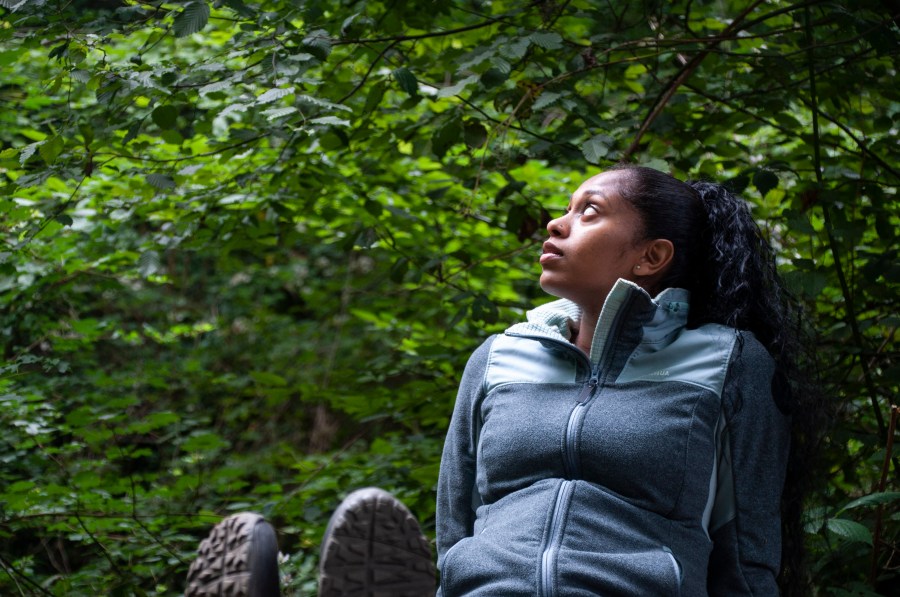
Kwesia taking time in nature. Credit: Mysterex
TGO: What does this time outdoors look like for the City Girl in Nature?
Kwesia: My time outdoors is always a journey of discovery, and now with my son Zulri very much an everyday adventure, as I get the chance to experience everything around us through his new eyes and feelings of wonderment. I’m an enthusiastic birder and starting to learn much more about all things bird since hosting the current series of the Get Birding podcast. I enjoy swimming and starting to get Zulri involved which as well is a joy.
I would say that I’m an all-rounder and open to new experiences from foraging to wildflower ID’ing to wetland exploring. My favourite spot is Deptford Park, on my doorstep. Open grass, several trees, a play area, and everyday people enjoying each other, and enjoying the outdoors. The more there is to discover, the more things are seen, the more everything starts to connect. We are not alone!
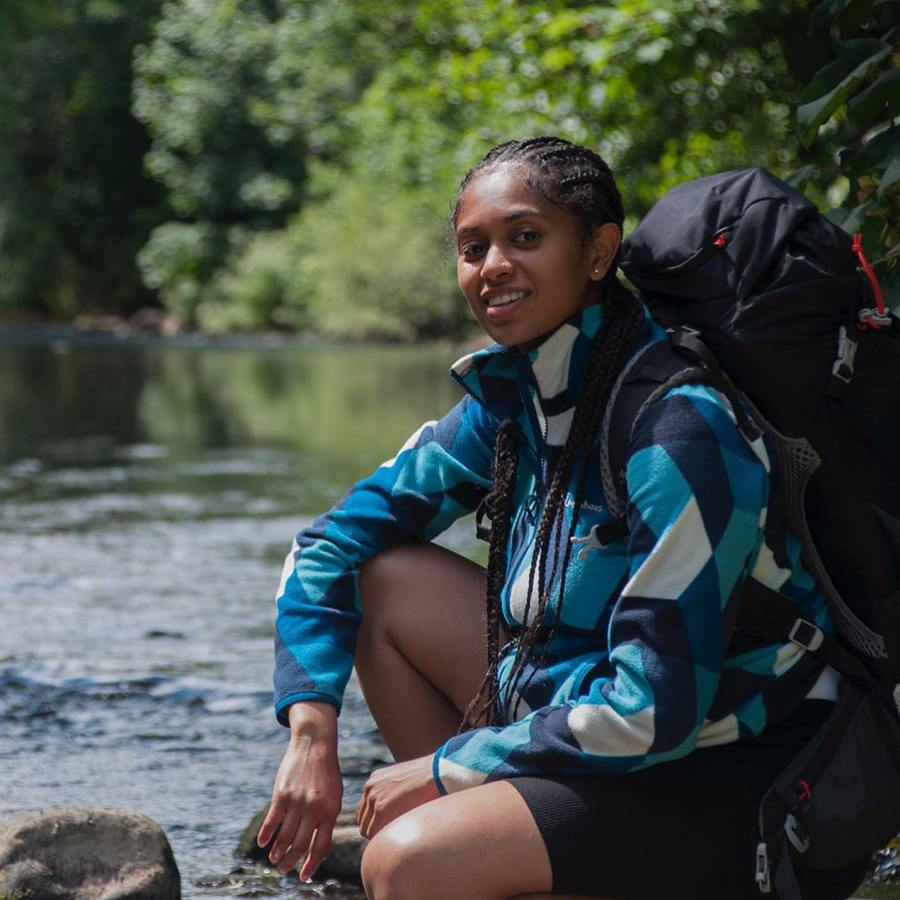
Enjoying the healing power of water. Credit: City Girl in Nature
TGO: In your experience working as City Girl in Nature, what are some of the primary barriers between young people and the ability to enjoy the benefits of time outdoors?
Kwesia: The young people I work with experience multiple challenges from living in low-income households and often unsuitable and unsafe housing. There is little room for play and exploration. Getting through the day, and from A to B, is their priority. Many have normalised their urban, overcrowded, and sometimes threatening environments as their realities. What they miss, and often do not see, is the natural spaces of light and wonder all around them…. the greenspaces, the grass verges, the trees, the birds, the sights, and soundscapes of nature. Pausing, creating safe spaces, bringing people together through workshops, and grounding, on the earth, and with the earth, are often small but magical pivots, which can open existing spaces into new vistas of respite and imagination, and recovery.
TGO: Of course, how to do better as an outdoors community is a huge question with a multitude of answers and plenty of people and businesses who should be taking accountability. What, in your own experience, has been the most powerful tool in enabling young people to get outdoors in nature?
Kwesia: Making a difference to just one person is so rewarding and purposeful. Through being relatable and try to be my authentic self is what I feel most connects with young people which encourages them to want to try to get out more and try to come out of their comfort zones. I feel that presenting myself as an example of what is possible, sharing my own journey of struggle and renewal, demonstrates to them that they too can also become their true selves.
Follow Kwesia’s adventures @CityGirlinNature on Twitter, YouTube and Instagram.
Read more: Has outdoor culture become too detached from nature?

